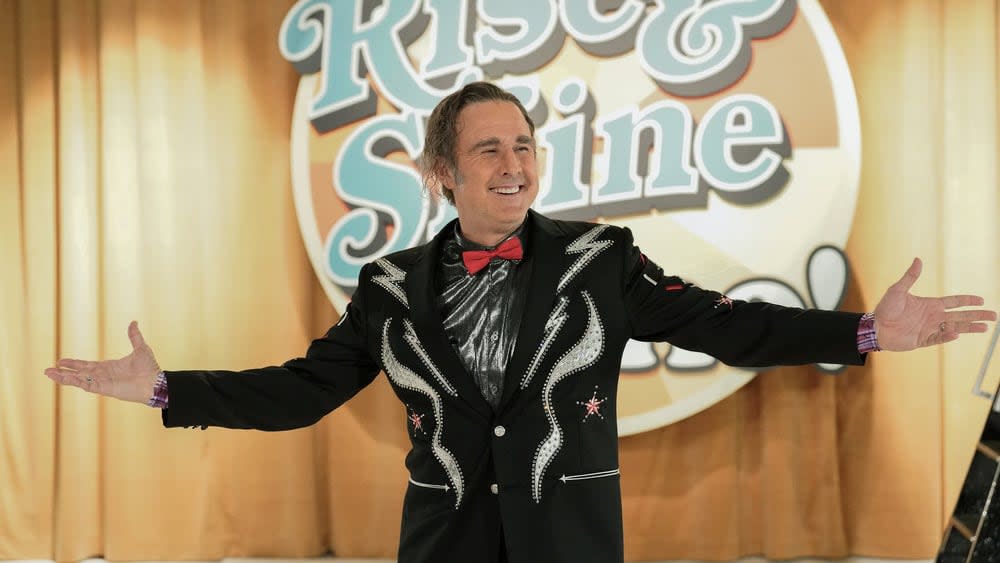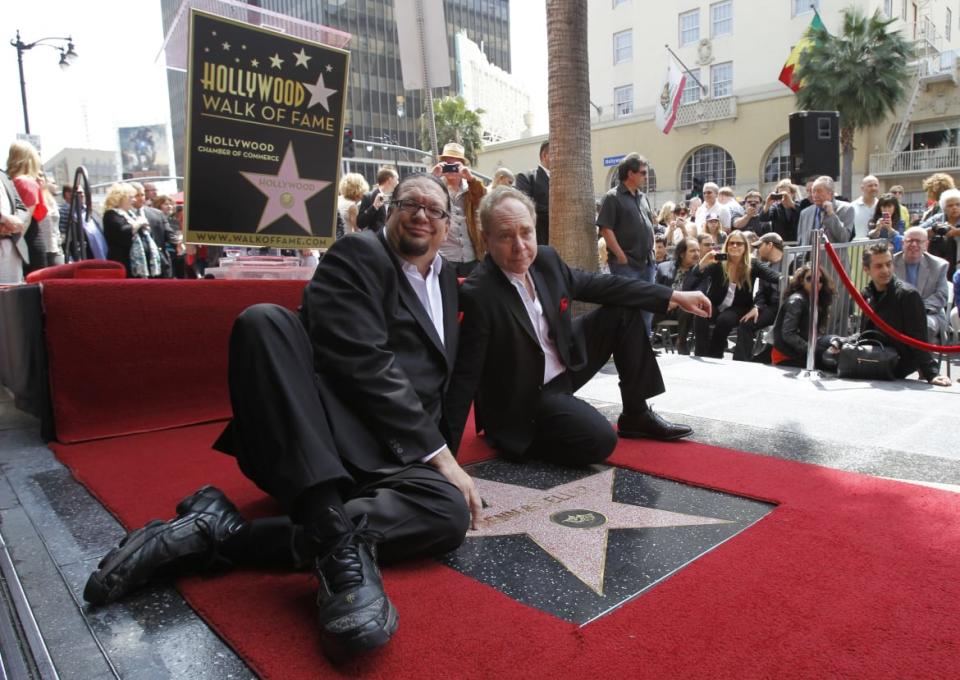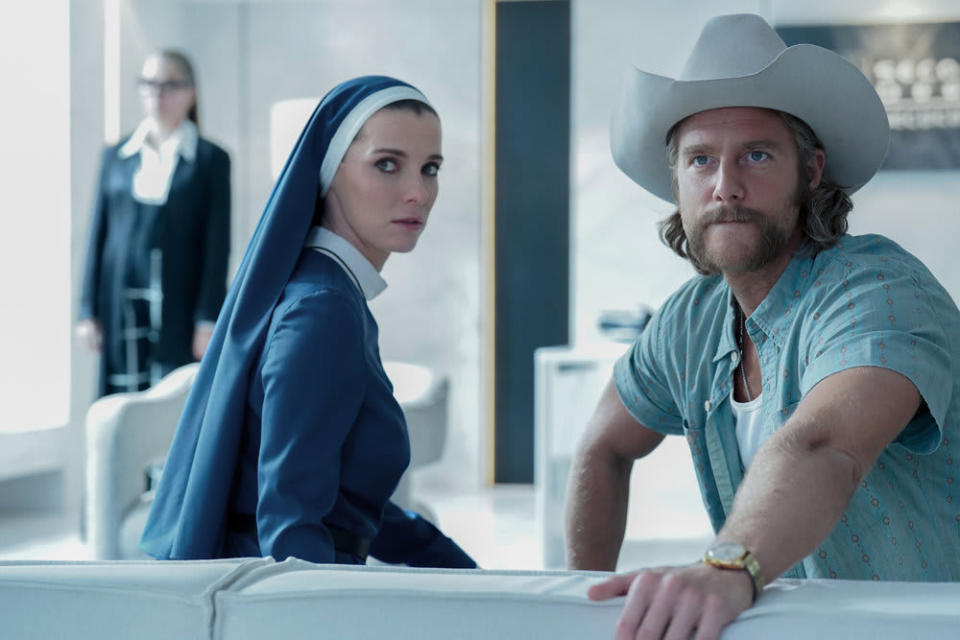Magic Legend Teller Reveals the Secrets of the Biggest ‘Mrs. Davis’ Tricks

The new TV series Mrs. Davis has the distinction of featuring one the most obscure production jobs in Hollywood.
There have been animal wranglers and folks who dress up in neon suits to dance in front of green screens. Someone had to train Harrison Ford how to use a bullwhip for Indiana Jones. And now, perhaps the strangest and most delightful of all, Teller of the famed magic duo Penn & Teller is training Betty Gilpin how to throw cards and pull off grandiose tricks on Mrs. Davis.
(Warning: Some spoilers ahead.)
Gilpin’s character (a nun named Simone), though, is steadfastly anti-magic. Growing up, Simone was forced to assist her parents perform hokey tricks on a Vegas stage. Ultimately, magic killed her father (or maybe didn’t, as is teased in the most recent episode, “Alison Treasures: A California Story”). Both her wild upbringing and her father’s death have led Simone to despise magicians—which, ultimately, makes her hate AI overlord “Mrs. Davis,” who heralds herself as part-robot-part-magician.

Teller, who has been performing silently with Penn Jillette since 1975, joined the show as the official “magic consultant” to assist with any scenes involving tricks. Simone’s hostility to his work, he says, is not all that uncommon.
“There is an aspect of magic that, even when you like it, even at its best, there’s part of it that’s just irritating because somebody is successfully lying to you,” Teller tells The Daily Beast’s Obsessed over Zoom. “Even if that’s what you want, even if that’s what you paid admission for, there’s a little part of you that pulls back against that. It’s a celebration of cognitive dissonance, in some way.”
Teller spoke (yes, he actually talked) about why Mrs. Davis appealed to him, how creators Tara Hernandez and Damon Lindelof consulted him as they wrote the show, and using AI to draft magic acts.
How ‘Mrs. Davis’ Staged a Super Bowl Commercial With Fake Nuns and the Holy Grail
How did you get involved with Mrs. Davis?
I played a role on The Big Bang Theory as Amy Farrah Fowler’s [Mayim Bialik] father. I was married to Kathy Bates for a brief while on TV! That led me to Tara [who was a writer and co-executive producer on the show]. I’ve always been impressed by how intense she is, how strong she is, and in this case, incredibly original. They knew my work and even wrote some magic stuff into The Big Bang Theory, too.
What kills me about [Mrs. Davis] is that, in addition to all of maybe the most imaginative stuff I’ve ever seen on a television show, they decided that they wanted to be as accurate as possible about magic and the magic terminology, so that the magic family would have a bit of credibility. They gave me the scripts and said, “Where are we using the right terms? Is this trick something that could be possible? How could we make it look like it’s possible?” I had great fun with it.
How often did you have to step in to correct their work?
They asked me about everything. “If we use the word force, is that the right way to use it? If this were a real magic trick, would you be able to do it the way we staged it?” In some cases, the answer was no. Then, they collaborated with me to come up with a way that would be plausible. There’s a piece of magic apparatus in which someone lies on a table and then is subsequently snuck down into the table. We created that, instead of what was originally there, which was a table that was so thin that no one could ever fit into it.
I believe that magicians watching the show are going to say, “Yeah, that’s OK!” As a magician, when you watch movies about magic, you often say, “Well, that’s nice, but it’s obviously just special effects that have nothing to do with the theatrical form of magic, which is what they’re depicting there.” They’re not saying this is real magic. They’re saying this is tricks. So my objective was to make it look a little less good, so it would look a little more like tricks.
Betty Gilpin Was Born to Play a Badass Nun Who Makes Out With Jesus
When we’re introduced to young Simone, she’s doing a big trick in Las Vegas with her parents. How did you help consult on that grand first act?
I was the most concerned about how little Simone was going to catch her card. So we taught grown-up Simone, Betty Gilpin—who is brilliant! Jesus, she’s so great. We taught her to do the move that you see later on when she’s sitting in the back of the car with the [fake stage parents] as an adult. It’s called a back palm. That sort of thing would work in those circumstances.
Then, I was the person who said, “To make that trick of the wife appearing in the big glass [case], you’re going to need to fill it with smoke for a good hefty beat.” If the person just appears and disappears there, it’s going to look like an optical effect. Whereas what they [did], it could be done. It would be very, very expensive, perhaps beyond the budget of that family. But it could be done.
In this episode, we get to see the trick that potentially killed Simone’s father. But we don’t actually see it, we see a dramatization with CGI dummies. This is the first time we haven’t seen the trick itself. Why is that?
When we were working on it, I know that they were very concerned about that particular thing, because it has a huge plot impact later. It does have to be convincingly designed as a trick for implications down the road.
Have you met folks like Simone who just loathe magic in the real world?
I’ve met a lot of people who are staunchly anti-magic over the years, because magic is such a dangerous form. Intrinsically, it is unpleasant. On one hand, you want it to amaze you. It’s built into the human being to look at something really intensely and go, “No, that’s not how that’s being done.” I always think of magic as this very basic art form, because it’s about the most important decision you ever make: “What is really going on here?” You must make that decision before you can make any other decisions. And if you make a mistake with that decision, sometimes it’s harmless, but very often it’s quite harmful. If you go for the amulet instead of cardiac surgery [in other words: choose magic over science], that’s a big mistake and it can cost you your life.

So, magic is this sort of playground where you’re allowed to enjoy making those mistakes, trying to figure out what’s going on, and there are no bad consequences. The central character of this show [is] concerned about it because they’re dealing with perception, religion, and all kinds of major monster forces. And they have it in the middle of this cheesy magic act that becomes the symbol of all of this.
Mrs. Davis claims that she is both a robot and a magician. Does that make sense to you, as a magician?
I mean, that’s the big question of the show, isn’t it? Piff the Magic Dragon recently connected with one of those popular AI services and said, “Write a piece of magic for Piff and Mr. Piffles.” The AI creature came back with five scenarios of which Piff said, “About two of these are really good.”
That’s a big question in entertainment right now: Can AI write movies and TV shows? So, in your opinion, can AI write magic tricks?
It’s fun to see what AI can do. A couple of weeks ago, I said, “Write a Penn. and Teller bit” to AI. The creature came back with some really funny, amusing ideas that were all digestions of things we’d done in the past. Whether that can take a leap and become something we can use in the future, I don’t know. When you produce a lot of material, you’re always looking for ideas, for a little something that will spark something. I would not be surprised if AI sparked something, even if it’s just by reminding me of something Penn and I did 30 years ago.
The Year the Nuns and the Gays Took Over SXSW
As a magician, what message about magic do you like that Mrs. Davis is saying?
The magic family involved is a family of pretty cheesy magicians. So they’re not my ideal of what great magic should be. But by putting magic at the center, it’s the center of what’s driving Simone, ultimately. It all tracks back to there. It’s made a wise choice because the whole show has the playfulness of a magic trick. You don’t know who’s a good guy, who’s a bad guy. You never know what exactly is going on. So you are perpetually watching [Mrs. Davis] like a magic act.
To put a magic act right in the middle of that says to me that the people who are writing the show understand the larger implications of magic, even if the version they have there is very cheesy. This is one of my favorite things I’ve ever been involved in because it’s so fucking bold. This show has brass balls and says, “You’re going to play catch up.” That’s so different from so much of TV, which is all about, “Sit there and be very content.”
Get the Daily Beast's biggest scoops and scandals delivered right to your inbox. Sign up now.
Stay informed and gain unlimited access to the Daily Beast's unmatched reporting. Subscribe now.

 Yahoo News
Yahoo News 
